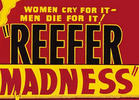
Barry Lyons’ Letter to a Prohibitionist - dedicated to four modern, stand-out prohibitionists, former U.S. Drug Czars William Bennett, Barry McCaffrey, John Walters and Gil Kerlikowske - takes readers on a brief tour of the history of the roots of the current War on Marijuana and, to lesser degree, the War on Some Drugs overall, first examining the thousands of years of marijuana use by humans.
Readers are then treated to various quotes from United States’ forefathers when they were discussing “Indian hemp.” He examines the history of marijuana prohibition, beginning in 1897 with the Indian Hemp Drugs Commission and on through today, then on to the early 20th Century campaign by, among many others, such stalwart anti-drug warriors as William Randolph Hearst, the father of “yellow journalism,” and Harry J. Anslinger, who started his career busting illegal alcohol operations during the U.S. experiment with alcohol prohibition, then moved to fighting the scourge of marijuana as commissioenr (a.k.a drug czar) of the federal Bureau of Narcotics. Lyons doesn’t cut our current crop of anti-science prohibitionist mouthpieces any slack either.

Prohibitionists love to claim that highway fatalities will rise exponentially as reform laws are passed by voters in state after state around the country, and world, asserting strongly that it should be blatantly obvious to any thinking person that no one wants to see anyone driving under the influence of marijuana in any form. While insisting marijuana has zero medical benefits, prohibitionist lawmakers did simultaneously allow the FDA to give permission for the development, production and sale of the medication Marinol, which is 100% pure, synthetic THC, the active ingredient in marijuana that gets people high. “That’s fantastic,” Lyons writes. “The government is telling us they are not particularly concerned about drivers who have ingested synthetic THC, which in turn means they ought not to be concerned by drivers who have ingested natural THC.”
While Letter to a Prohibitionist is ostensibly aimed at the Drug War funding addicted, science-lacking prohibitionists, it will do the reform side great benefit to pick up this slim, well-crafted book brimming with so many sane and rational ways to counter each and every argument raised by those dependent upon the continuance of the War on Some Drugs for their livelihood. Having read so many books and articles along these lines over the years, this one stands out for its concise, biting and thoughtful examination of the prohibitionists’ arguments, and why they are, and should be, ever more rapidly losing their war.






